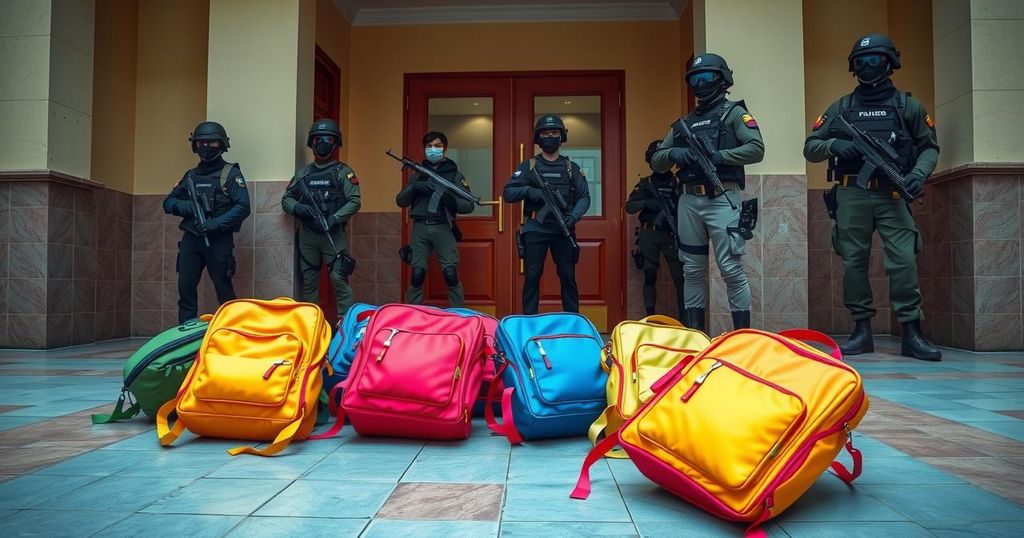Crime
AFP, AFRICA, CRIME, CUBA, DINA BOLUARTE, FREEDOM TO EDUCATE COLLECTIVE, GIA, GIANNINA MIRANDA, HUMAN TRAFFICKING, IMPRISONMENT, LATIN AMERICA, MALI, NORTH AMERICA, PAUL FLORES, PERU, SAN, SOCIAL ISSUES, SOUTH AMERICA, TREN DE ARA, TREN DE ARAGUA, UNITED STATES, VENEZUELA, VIOLENCE
Elena Martinez
0 Comments
Peruvian Schoolchildren Under Threat from Extortion Gangs
Extortion gangs in Peru are increasingly targeting fee-paying schools, demanding hefty protection payments from staff and parents under threat of violence. This has prompted many private schools to close and shift to online classes due to fear for students’ safety. The situation reflects growing concerns regarding public safety and the government’s ability to combat the escalating crisis.
In Lima, Peru, extortion gangs have extended their threats to fee-paying schools, demanding large sums of money from parents and staff under the threat of violence. Hundreds of private institutions have shifted to online classes due to escalating fears for student safety, showcasing a severe security crisis in the region. Recently, an attack occurred at San Vicente School after it refused to pay $27,000 in protection money, forcing its 1,200 students to remain home for a month.
Upon returning to school, students were met with the alarming presence of five armed soldiers stationed at the entrance, reflecting the pervasive atmosphere of fear. Extortion has escalated significantly in Peru, with gang members reportedly generating substantial profits, making this illegal activity more profitable than drug or human trafficking. In response to the rising violence, President Dina Boluarte declared a state of emergency in Lima, deploying soldiers to curb killings associated with extortion incidents.
Schools such as San Vicente, which charge substantial tuition fees, have become prime targets for these criminal groups. According to Giannina Miranda, head of the Freedom to Educate Collective, around 325 private schools have had to suspend face-to-face learning indefinitely, with a total of 500 affected by extortion practices. Parents express deep concerns for their children’s safety, with many contemplating keeping them at home due to the ongoing threats.
The management of San Vicente received a menacing WhatsApp message prior to the bombing, demanding payment to avoid targeting the school. Following the attack, they received another chilling warning via video, concluding with threats against school personnel and parents. This climate of anxiety has driven many families to reconsider sending their children to school.
Despite a reported 13 percent decline in extortion complaints filed to the police, many victims remain afraid to report incidents due to safety concerns. In addition, the homicide rate in urban Peru reached a two-decade high in just the first three months of the year. Comparisons have been drawn between the current climate of fear and the violent insurgency experienced in Peru during the 1980s and 1990s. President Boluarte faces significant pressure, with a staggering 93 percent of Peruvians expressing dissatisfaction with her ability to manage the unfolding crisis.
The rise of extortion gangs in Peru poses a severe threat to educational institutions, resulting in widespread fear and the closure of many private schools. The government has responded with emergency measures; however, security concerns continue to loom large over families and children, causing a significant decline in school attendance. With rising homicides and public disapproval of leadership, the situation in Peru demands urgent attention to restore safety and order.
Original Source: www.france24.com




Post Comment